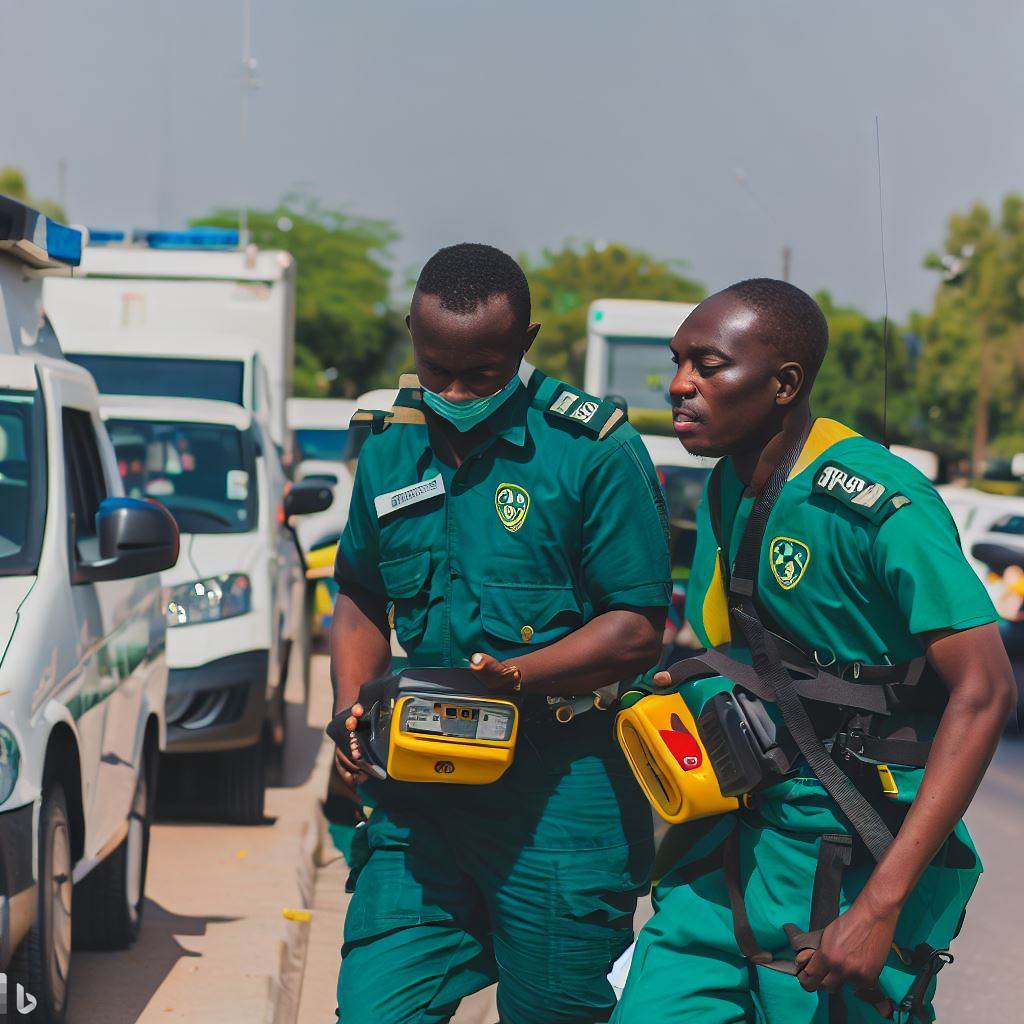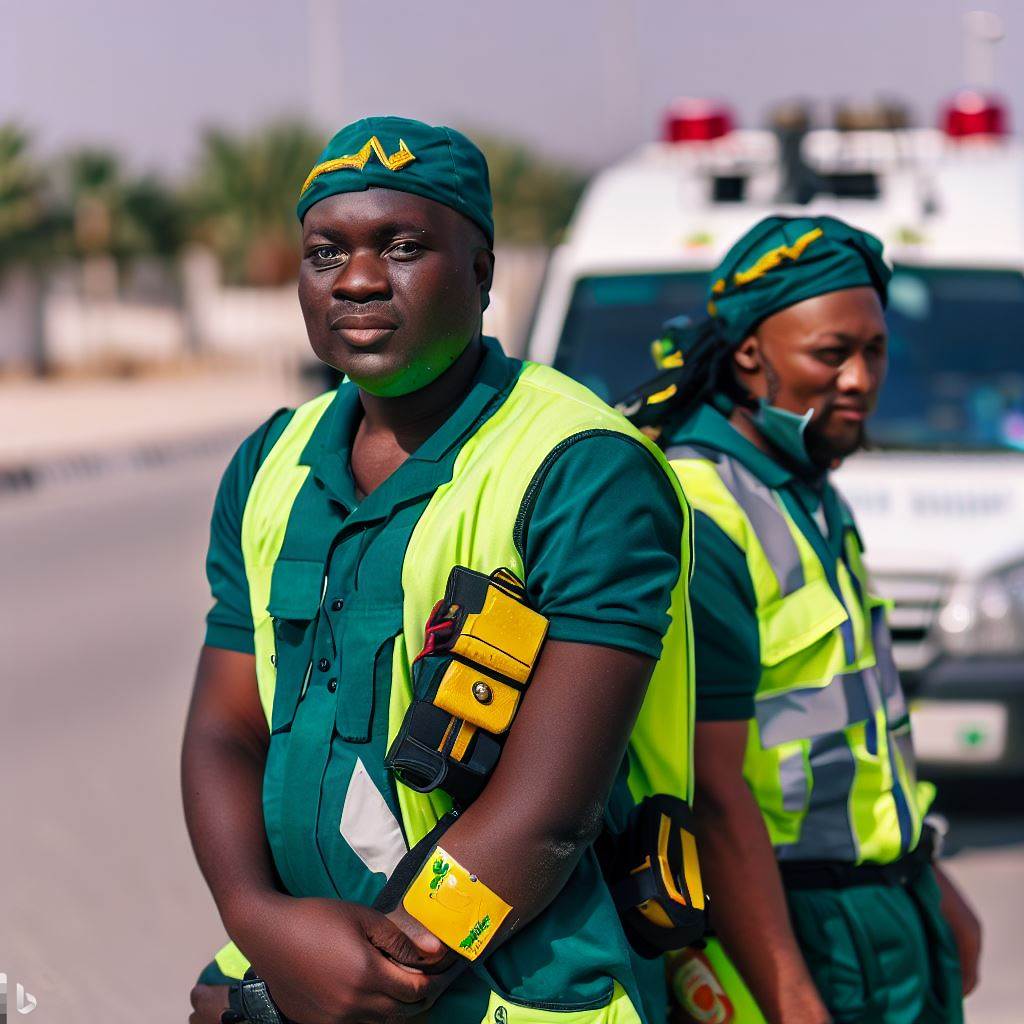Introduction
Nigerian Paramedics Emergency Challenges present grave risks to public health and well-being.
With a teeming population of over 200 million people, Nigeria faces a myriad of emergency situations such as road accidents, natural disasters, and outbreaks of diseases.
Paramedics play a crucial role in addressing these challenges by providing immediate medical assistance and saving lives.
Their specialized training equips them with the necessary skills to quickly assess and stabilize patients in critical conditions.
In Nigeria, the importance of paramedics cannot be overstated. They are essential in bridging the gap between emergency situations and healthcare facilities, especially in remote and underserved areas.
Paramedics are trained to administer life-saving interventions on the scene, ensuring that patients receive timely and appropriate care.
Moreover, paramedics are often the first responders to emergencies, providing vital assistance before the arrival of doctors or nurses.
Their ability to perform procedures such as CPR, administering medications, and immobilizing injured individuals is instrumental in increasing the chances of survival.
Additionally, paramedics play a crucial role in disaster management and response.
During natural disasters or large-scale emergencies, paramedics work tirelessly to triage patients, coordinate medical resources, and provide immediate care to those in need.
Their presence and expertise ensure a coordinated response and effective allocation of resources.
Most importantly, emergency challenges in Nigeria necessitate the presence and expertise of paramedics.
Their role in addressing these challenges cannot be underestimated, as they provide life-saving medical interventions, bridge the gap between emergencies and healthcare facilities, and contribute to disaster management and response efforts.
Read: Volunteerism and Its Role in Nigerian Paramedicine
Training and Education of Nigerian Paramedics
Paramedics are vital frontline healthcare professionals who play a crucial role in saving lives during emergencies.
In Nigeria, the qualifications and training required to become a paramedic are rigorous and comprehensive.
Description of qualifications and training
To become a paramedic in Nigeria, individuals must first possess a minimum of a secondary school certificate or its equivalent.
After completing secondary education, aspiring paramedics must enroll in a recognized paramedic training program, which typically lasts for about two to three years.
Paramedic training programs focus on equipping students with theoretical knowledge and practical skills necessary to provide pre-hospital care.
Subjects covered during training include anatomy, physiology, medical emergencies, trauma management, pharmacology, and patient assessment.
Students also undergo hands-on training in ambulance operations, cardiopulmonary resuscitation (CPR), advanced life support techniques, and handling medical equipment.
Upon successful completion of the training program, aspiring paramedics must pass a national certification examination conducted by the Medical and Dental Council of Nigeria (MDCN).
Importance of continuous education and specialization
Continuous education and specialization are essential for paramedics to keep pace with advancements in medical knowledge and techniques. As healthcare evolves, so should the skills and expertise of paramedics.
Continuous education programs help paramedics stay updated on the latest treatment protocols, guidelines, and best practices.
Specialization in areas such as pediatric care, geriatric care, trauma management, and critical care enables paramedics to provide specialized care based on the unique needs of each patient.
Advanced certifications, such as Advanced Cardiac Life Support (ACLS) and Pediatric Advanced Life Support (PALS), enhance the competencies of paramedics and improve patient outcomes.
Paramedics can pursue higher education, such as bachelor’s or master’s degrees in emergency medical services, to further enhance their knowledge and career prospects.
Challenges faced in providing comprehensive training
Limited funding and resources pose significant challenges in providing comprehensive training to paramedics in Nigeria.
There is a shortage of qualified instructors and training facilities, particularly in rural areas, hindering access to quality education for aspiring paramedics.
Outdated curriculum and lack of standardized training programs make it difficult to ensure uniformity in the education and training of paramedics across the country.
Keeping up with advancements in technology and medical practices requires continuous investment in training equipment and materials.
Paramedics often face challenges in accessing continuous education opportunities due to financial constraints and limited availability of professional development programs.
In the end, the training and education of Nigerian paramedics are crucial for ensuring the provision of high-quality pre-hospital care.
Continuous education and specialization allow paramedics to stay competent and provide specialized care to patients.
However, addressing the challenges faced in providing comprehensive training is a vital step towards improving the overall healthcare system and saving more lives in emergency situations.
Read: A Day in the Life of a Nigerian Paramedic: Personal Stories
Role of Nigerian Paramedics in Emergency Situations
Paramedics play a crucial role in emergency situations, providing immediate medical care and transportation to those in need. Their primary duties and responsibilities involve:
- Responding to emergency calls and assessing the patient’s condition.
- Administering first aid treatments and life-saving procedures, such as CPR.
- Stabilizing patients through immobilization and maintaining vital signs.
- Assisting in childbirth and providing care to neonates.
- Administering medications and intravenous fluids.
- Transporting patients safely and efficiently to medical facilities.
- Collaborating with other healthcare professionals to ensure seamless patient care.
Nigerian paramedics encounter a wide range of emergency cases on a daily basis, including:
- Traumatic injuries from motor vehicle accidents or falls.
- Cardiac emergencies such as heart attacks and arrhythmias.
- Respiratory distress caused by asthma, pneumonia, or choking.
- Stroke and seizure-related emergencies.
- Diabetic emergencies, including hypoglycemia and hyperglycemia.
- Allergic reactions and anaphylaxis.
- Maternal and neonatal emergencies during childbirth.
Effective communication and decision-making skills are vital for paramedics to provide efficient and quality care. Communication:
- Enables paramedics to understand the patient’s condition and medical history.
- Helps paramedics collaborate with other healthcare professionals for optimal patient outcomes.
- Allows paramedics to provide clear instructions to patients and bystanders during emergencies.
Paramedics must also possess strong decision-making skills to prioritize care and make critical decisions:
- Assessing the severity of injuries or illnesses and determining the appropriate level of care.
- Deciding on the safest and most efficient transportation method based on the patient’s condition.
- Administering necessary medications and treatments based on the patient’s symptoms and medical history.
- Adapting to rapidly changing situations and adjusting treatment plans accordingly.
In emergency situations, where time is of the essence, paramedics must make split-second decisions that can mean the difference between life and death.
Their ability to remain calm under pressure is crucial in delivering effective care.
In essence, the role of Nigerian paramedics in emergency situations is vital for saving lives and providing immediate medical care.
Read: The Impact of COVID-19 on Paramedics in Nigeria
Challenges Faced by Nigerian Paramedics
Nigerian paramedics play a crucial role in combating emergency challenges in the country.
However, they are faced with numerous obstacles that hinder their ability to provide efficient and effective emergency medical services.
This article will explore some of the major challenges encountered by Nigerian paramedics and the impact they have on emergency response.
Lack of resources and equipment in emergency response units
One of the key challenges faced by Nigerian paramedics is the lack of adequate resources and equipment in emergency response units.
Due to limited funding and insufficient budget allocation, many emergency response units lack basic medical supplies and life-saving equipment.
Without proper tools and resources, paramedics struggle to provide the necessary care and support to patients in critical conditions.
This shortage of resources not only jeopardizes the lives of patients but also puts immense pressure on paramedics, forcing them to work under challenging circumstances.
Limited accessibility to advanced medical technologies
Another significant challenge faced by Nigerian paramedics is the limited access to advanced medical technologies.
Sophisticated medical equipment and technologies are crucial in emergency situations, as they enable paramedics to accurately diagnose and treat patients.
However, due to financial constraints and lack of infrastructure, many paramedics are not equipped with the latest medical advancements.
This limits their ability to provide timely and efficient care, ultimately impacting patient outcomes.
High number of emergency cases and understaffed facilities
Nigeria faces a high number of emergency cases on a daily basis, overwhelming paramedics and emergency response facilities.
Unfortunately, these facilities are often understaffed, with a limited number of paramedics available to handle the growing demand.
This leads to delays in response times and compromises the quality of care provided to patients.
Understaffed facilities also burden paramedics with excessive workloads and increased pressure, which can lead to fatigue and burnout.
Basically, Nigerian paramedics face several challenges in their efforts to combat emergency situations effectively.
The lack of resources and equipment in emergency response units, limited accessibility to advanced medical technologies, and the high number of emergency cases coupled with understaffed facilities are all major obstacles that hinder their ability to provide optimal care.
It is essential for the government and relevant stakeholders to address these challenges by investing in the healthcare system, providing adequate funding, and prioritizing the well-being of Nigerian paramedics.
Only through these measures can the emergency response system in Nigeria be strengthened and lives saved.
Read: Road to Becoming a Successful Paramedic in Nigeria

Improvement Initiatives for Nigerian Paramedics
Paramedics play a critical role in addressing emergency challenges in Nigeria. To ensure their effectiveness and efficiency in saving lives, several improvement initiatives can be implemented. These initiatives include:
Collaboration with international agencies for training and resource development
By partnering with international agencies, Nigerian paramedics can benefit from their expertise and resources.
This collaboration can involve training programs that focus on the latest techniques and best practices in emergency care.
It can also include the provision of necessary equipment and supplies to enhance the paramedics’ capabilities.
Such partnerships can significantly contribute to improving the overall quality of emergency healthcare in Nigeria.
Implementation of community-based emergency response systems
Establishing community-based emergency response systems can greatly enhance the efficiency of paramedic services in Nigeria.
This involves training community members to respond to emergencies and provide basic life support until the arrival of professional paramedics.
By empowering communities to take action during emergencies, the response time can be reduced, ultimately saving more lives.
Advancements in telemedicine and digital healthcare solutions
With the continuous advancements in technology, telemedicine and digital healthcare solutions can significantly improve the effectiveness of Nigerian paramedics.
These solutions allow paramedics to communicate with medical experts remotely, enabling real-time consultations and guidance.
Paramedics can transmit vital signs, images, and other relevant information to medical professionals, who can then provide accurate diagnoses and treatment recommendations.
This remote support can be particularly beneficial in rural areas where access to healthcare facilities is limited.
In general, improving the capabilities of Nigerian paramedics is crucial in combating emergency challenges effectively.
Collaboration with international agencies, implementation of community-based emergency response systems, and advancements in telemedicine and digital healthcare solutions are key initiatives that can enhance the overall emergency care in Nigeria.
It is essential to prioritize these improvement initiatives to ensure the safety and well-being of Nigerians during emergencies.
Read: How to Become a Diagnostic Medical Sonographer in Nigeria
Success Stories of Nigerian Paramedics
Highlighting exceptional cases where Nigerian paramedics saved lives
The Miracle on Lagos Bridge
A car accident on the Third Mainland Bridge left a young woman trapped inside her vehicle, unconscious and in critical condition.
Nigerian paramedics arrived on the scene and worked tirelessly to extricate her from the wreckage.
Despite the challenging circumstances, they managed to stabilize her and transport her to the nearest hospital in record time.
Thanks to their quick actions and medical expertise, the young woman made a full recovery.
Rush Hour Rescue
During the chaotic rush hour traffic in Lagos, a man suddenly collapsed on the street due to a heart attack.
Nigerian paramedics, equipped with state-of-the-art medical equipment, arrived at the scene within minutes.
They skillfully performed CPR and administered life-saving medication, successfully reviving the man.
Their prompt response saved his life and reminded everyone of the crucial role paramedics play in emergency situations.
Recognizing the dedication and commitment of paramedics in serving the community
The Unsung Heroes
Nigerian paramedics work tirelessly around the clock, often facing challenging and life-threatening situations.
They respond to emergencies, providing critical medical care and transport to hospitals.
Despite the high demands and risks associated with their profession, paramedics remain dedicated to saving lives and ensuring the well-being of their community.
Training and Preparedness
Nigerian paramedics undergo rigorous training to acquire the necessary skills and knowledge to handle various emergencies.
From advanced life support techniques to trauma management, they are well-prepared to tackle any crisis.
This level of commitment and dedication ensures that Nigerian paramedics are always ready to provide the highest standard of care, even in the most challenging situations.
Inspiring stories that showcase the positive impact of paramedic services in Nigeria
From Victim to Paramedic
A young Nigerian woman, who survived a life-threatening accident herself, decided to become a paramedic to help others in need.
Her personal experience and determination drive her to excel in her role, providing compassionate care and support to those in distress.
Her story inspires many others to pursue a career in paramedicine, creating a ripple effect of positive change in the field.
Transforming Communities
Paramedic services in Nigeria have transformed communities, particularly in rural areas where access to healthcare is limited.
By providing emergency medical care and transportation, paramedics have become instrumental in saving lives and reducing mortality rates.
Their presence has brought comfort and reassurance to communities, transforming the perception of emergency services and instilling trust and confidence among the population.
All in all, Nigerian paramedics have proven time and time again their exceptional abilities and dedication to saving lives.
Their success stories highlight their crucial role in emergency situations, their unwavering commitment to the community, and the positive impact they have on individuals and society as a whole.
These inspiring stories serve as a reminder of the incredible work paramedics do and the importance of supporting and recognizing their contributions.
Conclusion
Nigerian paramedics face numerous challenges in their line of work. They often lack proper equipment and training, and are burdened by limited resources and infrastructure.
However, it is crucial that further investment is made in emergency response systems to address these challenges.
The importance of having well-equipped and well-trained paramedics cannot be overstated. They play a crucial role in saving lives and providing crucial medical care in emergency situations.
Without them, the outcomes for patients would be significantly worse.
To encourage more individuals to pursue a career as paramedics in Nigeria, it is essential that educational and training opportunities are improved.
The government should provide scholarships and incentives to attract young people to this noble profession.
Despite the challenges they face, Nigerian paramedics continue to demonstrate their dedication and resilience.
They are often the first responders in emergency situations, and their quick thinking and expertise can make a life-or-death difference.
Ultimately, Nigerian paramedics are unsung heroes who deserve recognition and support. They are on the front lines, combating emergency challenges and saving lives.
It is our collective responsibility to ensure they have the necessary resources and support to perform their vital work effectively.




